Photos: Electric Vehicle First Responder Training
BELCO and Eurocar Ltd today [Aug 9] hosted 22 members of Bermuda’s emergency services personnel to a “First Responder” training course specific to Renault electric vehicles [EVs].
A BELCO spokesperson said, “Run in partnership with Renault, the full day course covered identification of EVs; technical specifications; response procedure for an EV that has been involved in an impact; emergency response procedure for EVs involved in an impact while charging; response procedure for an EV that is on fire; procedure in the event of EV battery leak; how to deal with a submerged EV; towing of EVs that have been involved in an impact; and storage of damaged EVs.
“Participants included members of BELCO’s Fleet Mechanics, Safety Team and Fire Marshall; Bermuda Police Service; Bermuda Fire & Rescue Service; Bermuda Government’s Transport Control Department; Kind Edward VII Memorial Hospital; Lowe’s Towing Ltd; and St. John Ambulance.
“The training was administered by an authorized Renault trainer and covered the Renault van, Kangoo, Zoe and a quadricycle Twizy.”
“We are extremely pleased to host Bermuda’s first responder community for this training today,” said Ascendant’s Electric Vehicle Project Leader, Joshua Simons.
“The development and adoption of electromobility [e-mobility] technologies are quickly gaining momentum worldwide. Of these technologies, electric cars and trucks are playing a key role in shaping the future of mobility.”
.
“The adoption of electric vehicles has considerable environmental and financial benefits, both of which influence the growing popularity and demand for EVs.
“BELCO recognizes the benefits of EV adoption and has begun the conversion of its fleets, with the aim of a full EV conversion by 2025.
“Of the various classes of vehicles that BELCO operates, we have started the conversion process with our intermediate van fleet, with plans to convert our light and heavy truck fleets as soon as appropriate EV replacements are identified.
“EVs have systems that differ from traditional internal combustion engine [ICE] vehicles and can present hazards to untrained first responders, emergency personnel and other service providers. It is for this reason that BELCO reached out to Eurocar [Renault dealer] to partner in running today’s “first responder’s” training course.
“While the motivation for arranging this training stemmed from BELCO’s own adoption of EVs, we know it will also create additional safety benefits relating to any other EVs that may find themselves in an emergency situation.”
“BELCO’s intermediate fleet conversion will see the replacement of 12 Mitsubishi L300 diesel vans with Renault Kangoo Maxi Z.E. vans that are expected to be in operation by the fourth quarter of 2016. The company has also developed an all electric carpool program that consists of two Renault Zoe cars.”
Lieutenant Jay Donawa from the Bermuda Fire and Rescue Service said, “So far, it’s been a great experience. We were invited by BELCO. The initiative was taken out by Belco through Renault and Eurocar. They put an invitation to the fire service so today we had 3 personnel from the fire service that are here.
“We started off with PowerPoint presentations in the morning, learning about the components of the vehicle, and the hazards. Now in the afternoon session, we’ve actually come out and learned how to mitigate any of the hazards as it relates to us out in the field, when we respond to calls, whether it’s a fire call or a road traffic collision, how to basically neutralize the vehicle.
“It’s been a very, very useful day, very informative, and a great experience. I’m hoping to take this back to all the members in the fire service, and disseminate the information, and to further train each individual so that when the vehicles go out to the calls, that we’re ready to deal with any of the situations as it deals with the electric cars.”
Asked if dealing with electrical vehicles will be an added hindrance in emergency situations, Lieutenant Donawa said, “Well not now that we’ve been trained or been exposed to the various hazards. The vehicle presents just as many hazards as it would a regular diesel or gasoline driven vehicle, as run by a 12 volt battery.
“It’s basically neutralizing the car’s lock off procedure, and I guess once each individual is trained and proficient in that, I don’t think we would have too many problems. We will address or we will deal with the electric vehicles just as we do with the regular vehicles.”
Jeffrey Patterson, Supply Chain Manager and Project Manager of the EV Program at BELCO said, “We have Renault here, and they are teaching the first responders on the island how to respond to a vehicle that’s been in an accident, which is an electric vehicle.
“This morning’s class was all done about the theory. Right now, we’re going through the practical side and teaching them how to disconnect the main transmission battery. It’s a 400 vault, 22 kilowatt battery, and how to make it safe for people to then touch and work on the vehicle after it’s been in an accident.
“Right now, they have the fire department, ambulance, police, going through and doing the actual practical and learning how to do the disconnect and tag out lock out of this vehicle.”
“There’s plus and minuses as the fire department was discussing this morning. When they take a combustion engine of a normal combustion car, it gets in an accident and they have to worry about hot spots of the motor, exhaust, things of that nature.
“From the electric vehicle, there is not exhaust. There is no hot spots. They’re actually safer from that point. On the reverse is they have to worry about the electrical shock.
“The electric vehicles today, which are Department of Transport certified, both through Europe and through the US, are very safe from electrical hazards or things of that nature. There is still a possibility.
“That’s why this training, the first responder training is happening, so they can know the hazards and how to do the mitigation of using proper PPEs, personal protection equipment, to make themselves safe, and people working around it.
Speaking the the importance of the training, Mr. Patterson said, “It’s very important. We’re looking at their safety first. They’re the people who are going to be on the scene first, taking care of the needs of the person in the accident. It’s very important to have them there to understand the hazards, and how to mitigate it so they’re safe to take care of the injured people.”
Asked for advice to personal owners of electrical vehicles, Mr. Patterson said, “People who have electrical vehicles really need to let people be aware. The biggest thing, and this is a discussion we had this morning, was in Bermuda, people who actually respond to accidents first aren’t the fire department, police, or ambulance.
“It’s the person who is going along and finds the accident. They go there and try to pull somebody to help them, as Good Samaritans and Bermudians are. They like to help people. It’s just making sure that they’re aware also that an electric vehicle has a different hazard than a combustion engine. That’s all.”
Click to enlarge photos:
Read More About
Category: Accidents and fires, All, Business, News, Photos

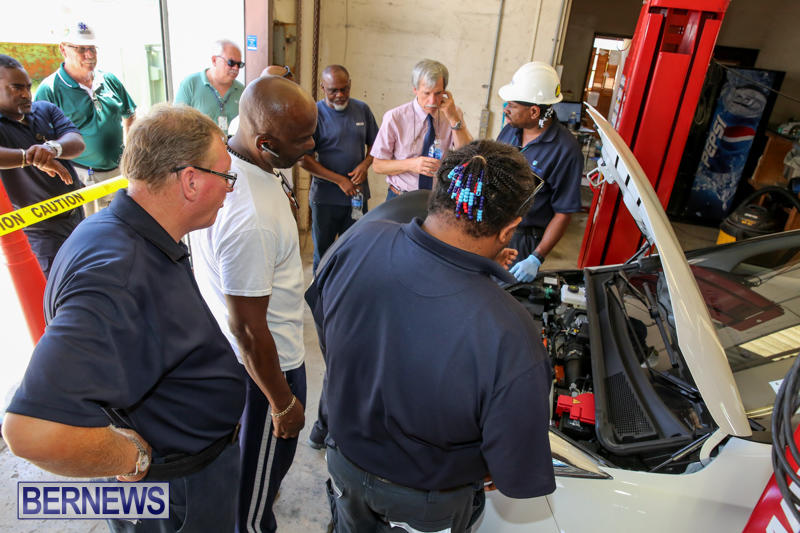
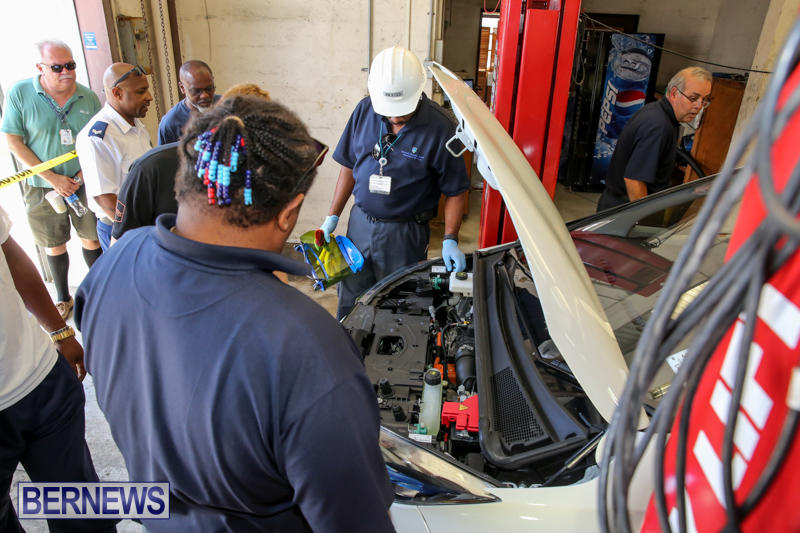
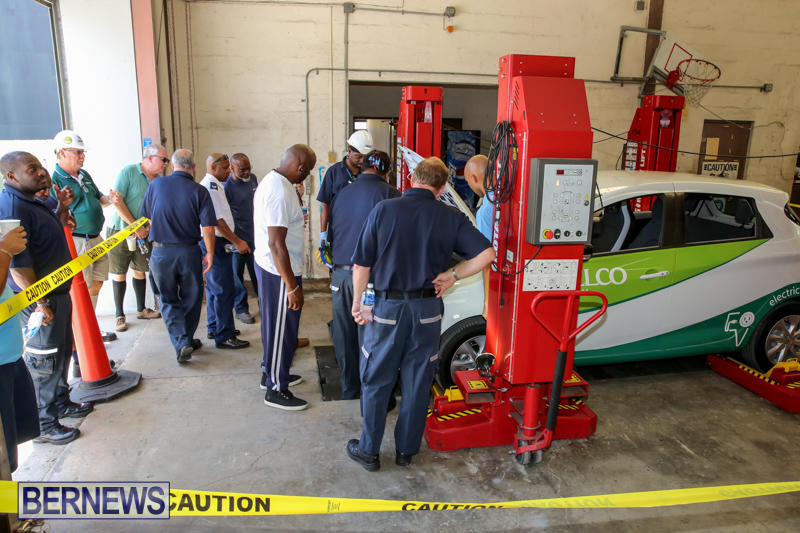
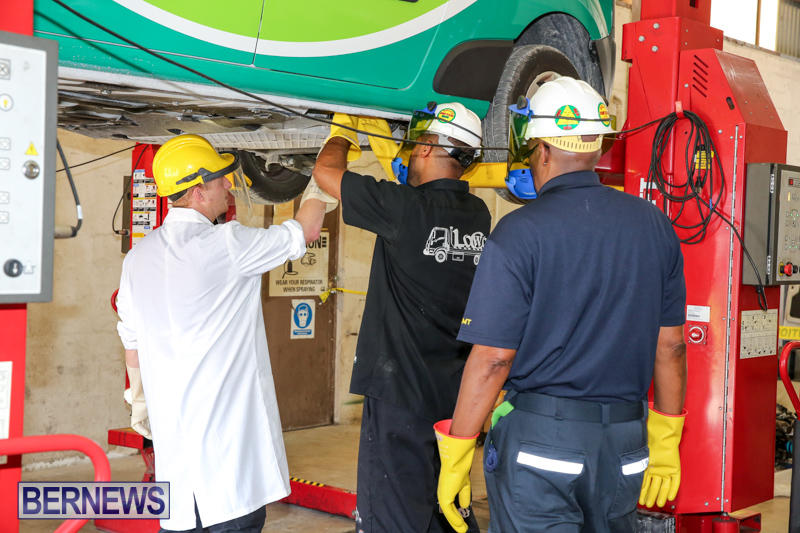
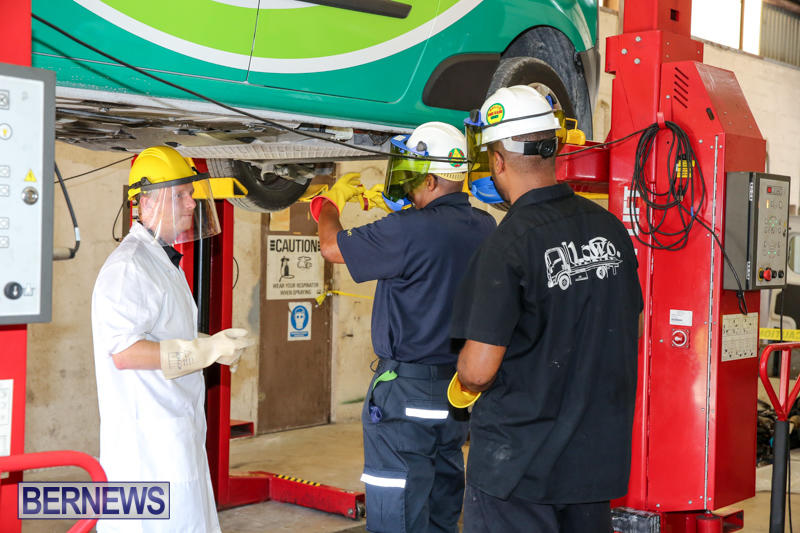
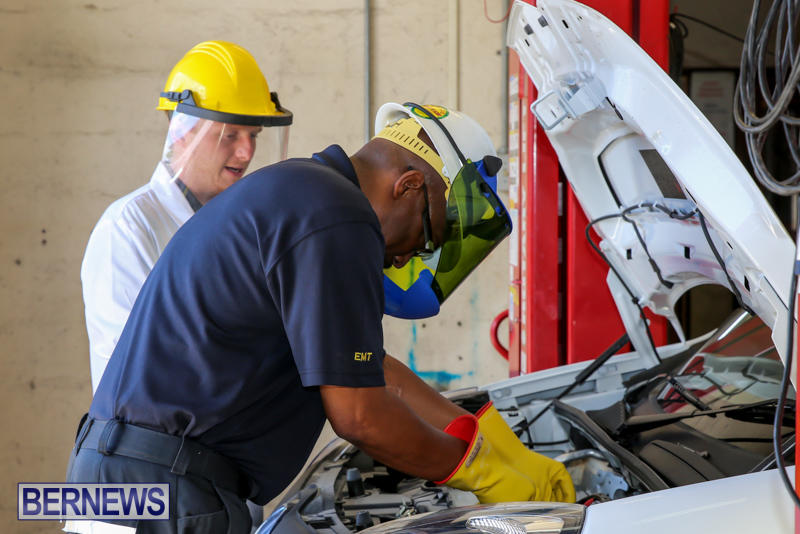
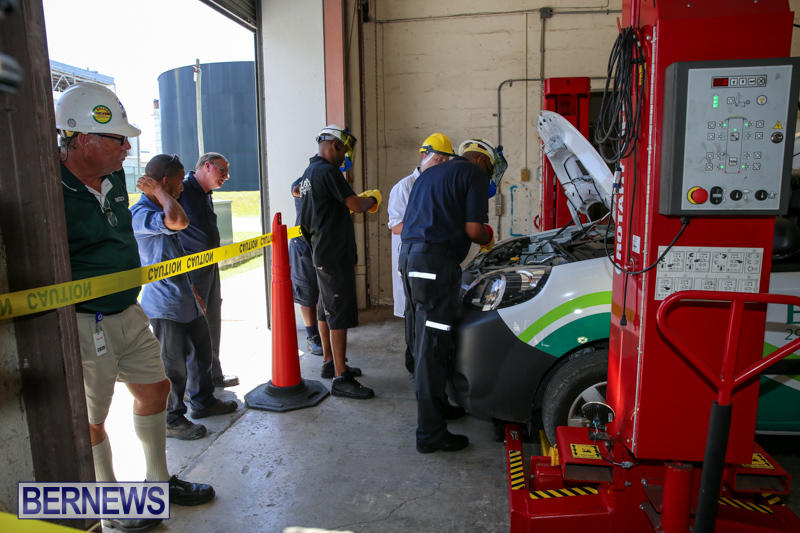
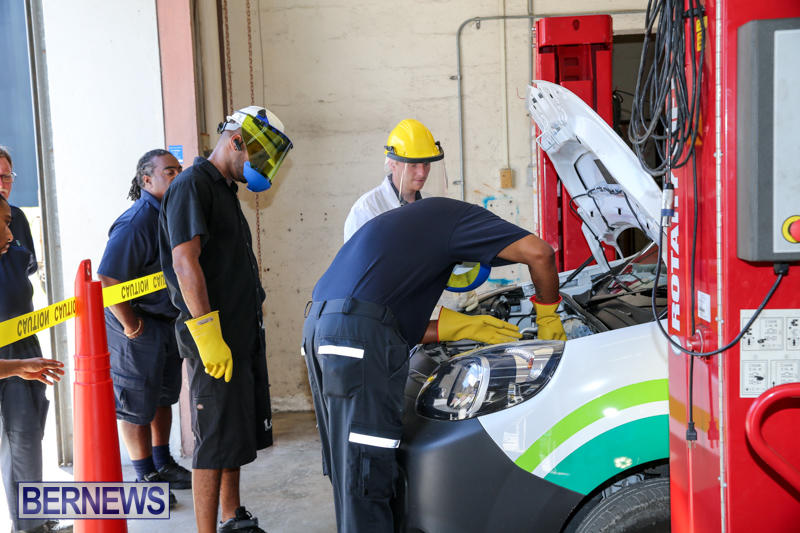
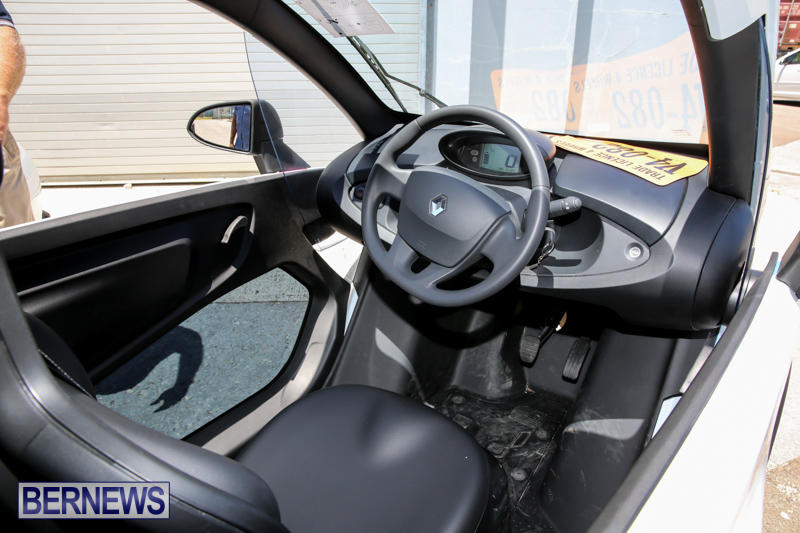
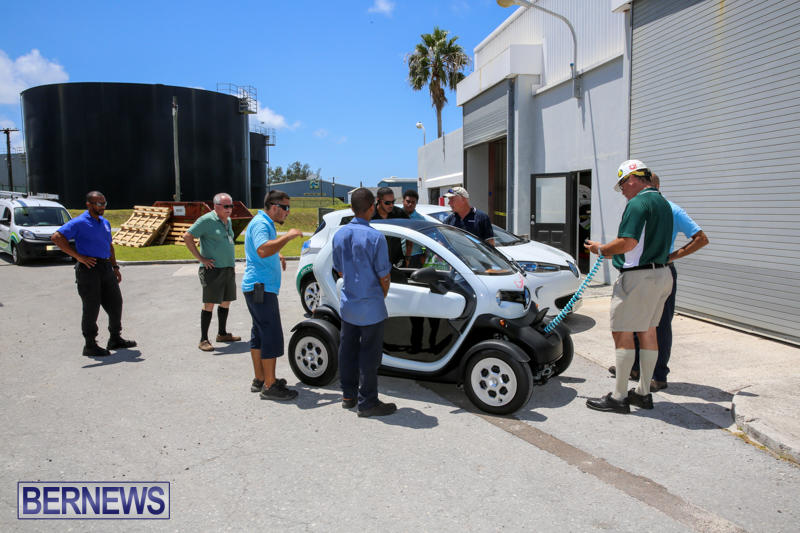
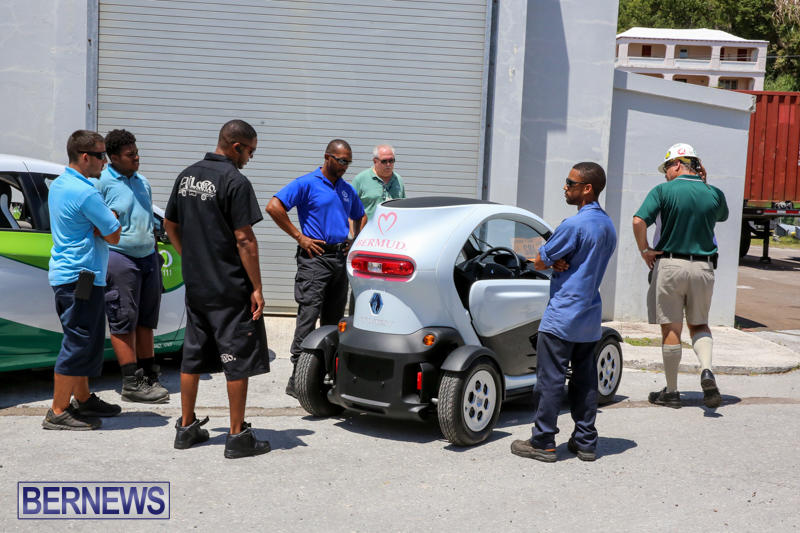
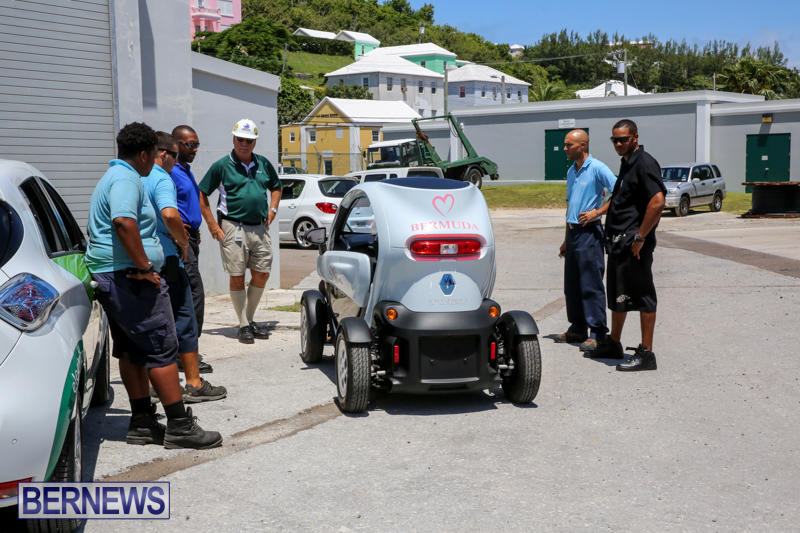
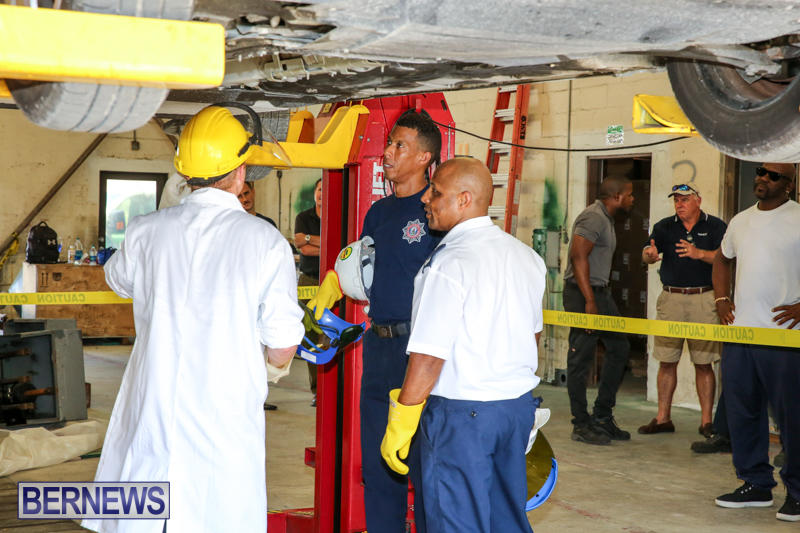
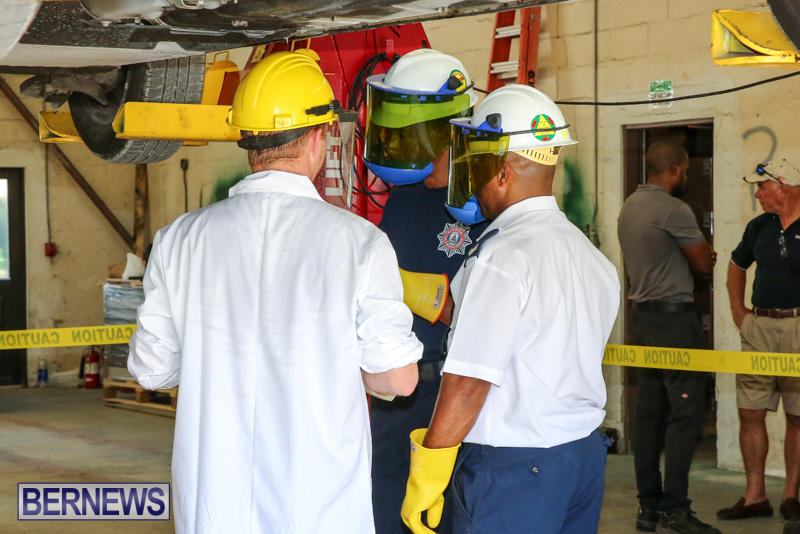
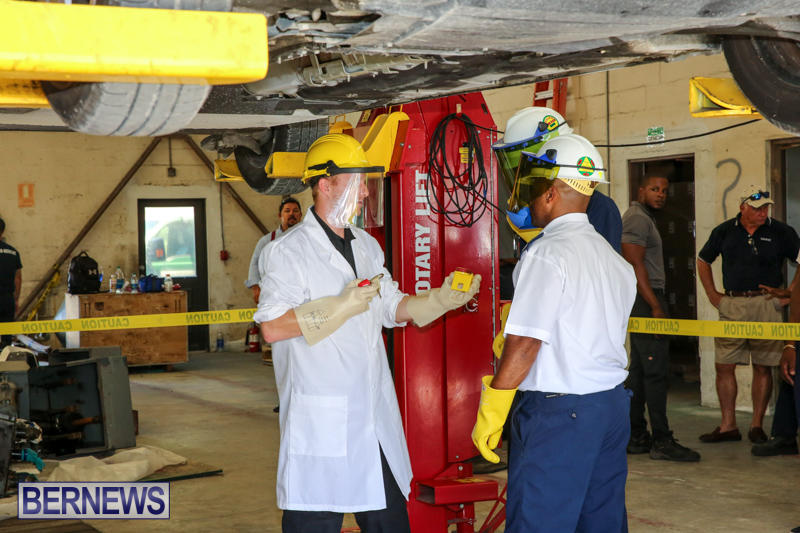
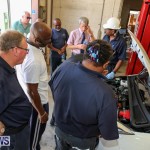
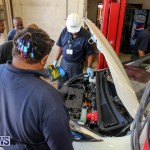
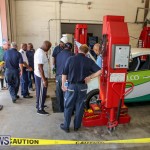
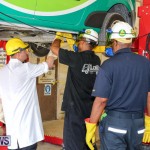
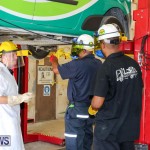
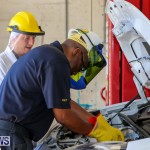
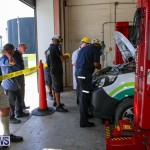
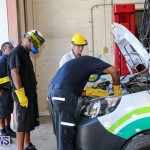
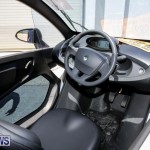
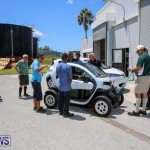
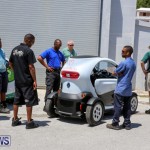
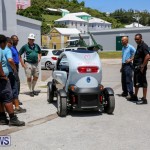
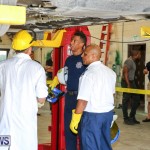
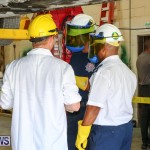
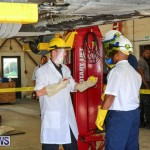

Looks like the OBA is pressing ahead with their plan to introduce rental cars to tourists…….
Dealers importing Twizys to rent already?
instead of being stuck behind a line of bikes are we now gonna be stuck behind a line of 1 seater cars? At least you stand a chance of getting around the bikes.
When have you ever been stuck behind a line of bikes?? Cars maybe but bikes will be long gone before you have noticed the light has changed.
Rentals silly, the point of the single seaters are intended for tourists. So i’ll ask you, how often are you stuck behind a line of tourists?
Read the above comments. They refer to rentals silly. The single seaters are intended for tourists. So i’ll ask you, how often are you stuck behind a line of tourists?
If you are going to drive those little things on the road you are going to need extra medical crews! Hope they make you wear helmets! It’s a motorbike with 4 wheels surely?
Been on the road in Europe in major City’s for 4 years, including a roll cage, airbags, and seat belt. Why would there be an increase in medics needed compared to cycle liveries
Only BELCO can afford to charge these things every day
EV’s are useless if we are using fuel at BELCO to essentially charge them up! More money in the pockets of BECLO! Sigh!
When are we going to focus on the REAL issue which is large scale renewable energy for the utility?
Wow some Bermudians do not understand progress. It costs way less to run an electric car and quadricycle (Twizy) than a gas or diesel vehicle. Even when charged by BELCO the carbon footprint is way less than a gas or diesel vehicle. As for paying BELCO, you don’t mind paying corporations that make billions of profit on selling fossel fuels!! The two strike 50 cc bikes that 16 year olds use and the rental companies use, are the worst offenders for pollution. So get educated and learn about what is going on in the world to make it better for all of us.
In the time it took me to read these comments there have been 4 assaults, 6 minor damage only accidents , 4 minor marine incidents and a Partridge in a Palm Tree on Ariel Sands property.
Thank God it’s Thursday.
Friday should be one hell of a start to a birp-burp….weekend.
Shalom.